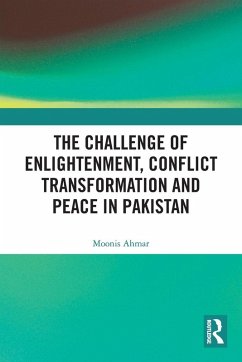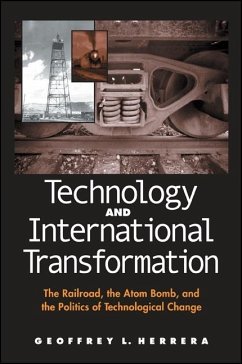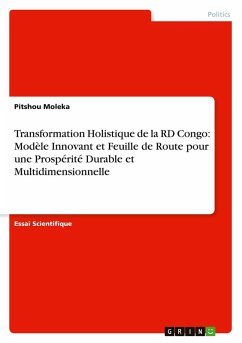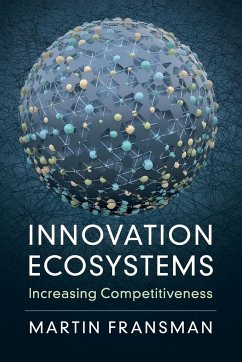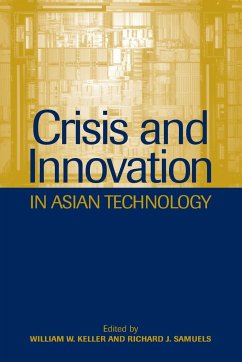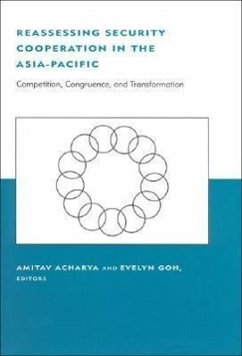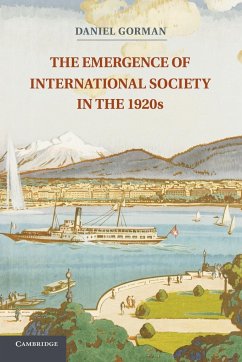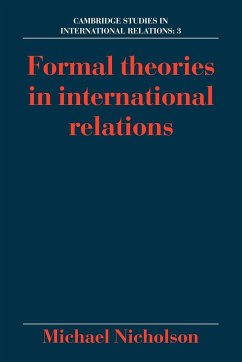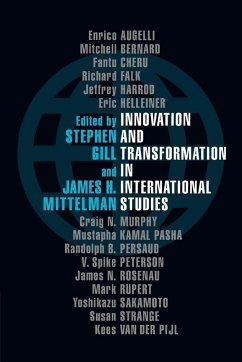
Innovation and Transformation in International Studies
Versandkostenfrei!
Versandfertig in 1-2 Wochen
43,99 €
inkl. MwSt.

PAYBACK Punkte
22 °P sammeln!
This book explores the nature of, and conditions for, theoretical innovation in international studies. Highlighting classic and new research problems, this collection of critically minded, original essays pushes international relations scholarship in uncharted directions. Bridging social theory and international relations theory, it searches for sources of intellectual innovation in the everyday lives of ordinary people. The seventeen contributors are drawn from four continents and include such leading scholars as Richard Falk, James Rosenau, Yoshikazu Sakamoto, and Susan Strange. Although a d...
This book explores the nature of, and conditions for, theoretical innovation in international studies. Highlighting classic and new research problems, this collection of critically minded, original essays pushes international relations scholarship in uncharted directions. Bridging social theory and international relations theory, it searches for sources of intellectual innovation in the everyday lives of ordinary people. The seventeen contributors are drawn from four continents and include such leading scholars as Richard Falk, James Rosenau, Yoshikazu Sakamoto, and Susan Strange. Although a diverse group, they find the contemporary world order is in the throes of a structural transformation, which can be partly understood in terms of emancipation: the self-actualisation of human potential and community that looks beyond the current era in which neo-liberal globalisation is dominant, to a more democratic and just world order.
Table of contents:
Part I. Rethinking Remaking the Roots of Global Social and Political Theory: 1. Transformation and innovation in the study of world order Stephen Gill; 2. Consciousness, myth and collective action: Gramsci, Sorel and the ethical state Enrico Augelli and Craig N. Murphy; 3. Critical realism and the demystification of interstate power E. H. Carr, Hedley Bull and Robert W. Cox Richard Falk; 4. Ibn Khaldun and world order Mustapha Pasha; Part II. Political Economy: the Social and Ecological Anatomy of Transformation: 5. Ecology, political economy and the counter-movement: Karl Polanyi and the second great transformation Mitchell Bernard; 6. Braudelian reflections on economic globalisation: the historian as pioneer, Eric Helleiner; 7. Social forces and international political economy: joining the two IRs Jeffrey Harrod; 8. Transnational class formation and state forms Kees van der Pijl; Part III. Transformation, Innovation and Emancipation in Global Political and Civil Society: 9. Globalisation and contested common sense in the United States Mark Rupert; 10. The silent revolution and the weapons of the weak: transformation and innovation from below Fantu Cheru; 11. Frantz Fanon, decolonisation and the emerging world order Randolph Persaud; 12. Whose crisis? Early and post-modern masculinism V. Spike Peterson; Part IV. Reflections on Global Order in the Twenty-First Century: 13. Civil society and democratic world order Yoshikazu Sakamoto; 14. Imposing global order: a synthesised ontology for a turbulent era James N. Rosenau; 15. The problem or the solution? Capitalism and the state system Susan Strange; 16. Rethinking innovation in international studies: global transformation at the turn of the millennium James H. Mittelman.
This book explores the nature of, and conditions for, theoretical innovation in international studies.
Table of contents:
Part I. Rethinking Remaking the Roots of Global Social and Political Theory: 1. Transformation and innovation in the study of world order Stephen Gill; 2. Consciousness, myth and collective action: Gramsci, Sorel and the ethical state Enrico Augelli and Craig N. Murphy; 3. Critical realism and the demystification of interstate power E. H. Carr, Hedley Bull and Robert W. Cox Richard Falk; 4. Ibn Khaldun and world order Mustapha Pasha; Part II. Political Economy: the Social and Ecological Anatomy of Transformation: 5. Ecology, political economy and the counter-movement: Karl Polanyi and the second great transformation Mitchell Bernard; 6. Braudelian reflections on economic globalisation: the historian as pioneer, Eric Helleiner; 7. Social forces and international political economy: joining the two IRs Jeffrey Harrod; 8. Transnational class formation and state forms Kees van der Pijl; Part III. Transformation, Innovation and Emancipation in Global Political and Civil Society: 9. Globalisation and contested common sense in the United States Mark Rupert; 10. The silent revolution and the weapons of the weak: transformation and innovation from below Fantu Cheru; 11. Frantz Fanon, decolonisation and the emerging world order Randolph Persaud; 12. Whose crisis? Early and post-modern masculinism V. Spike Peterson; Part IV. Reflections on Global Order in the Twenty-First Century: 13. Civil society and democratic world order Yoshikazu Sakamoto; 14. Imposing global order: a synthesised ontology for a turbulent era James N. Rosenau; 15. The problem or the solution? Capitalism and the state system Susan Strange; 16. Rethinking innovation in international studies: global transformation at the turn of the millennium James H. Mittelman.
This book explores the nature of, and conditions for, theoretical innovation in international studies.





